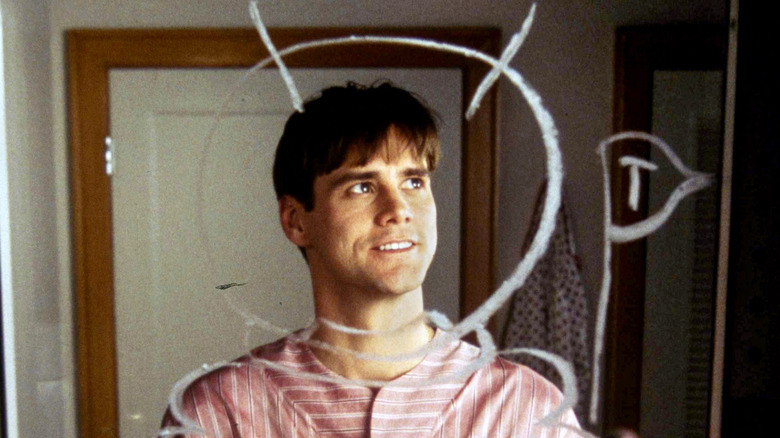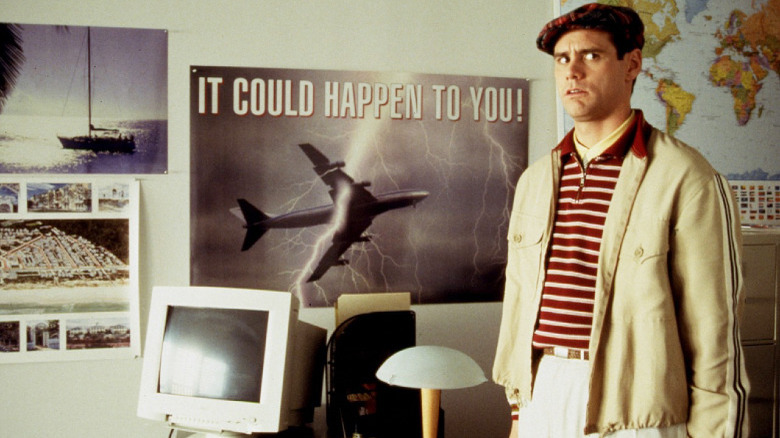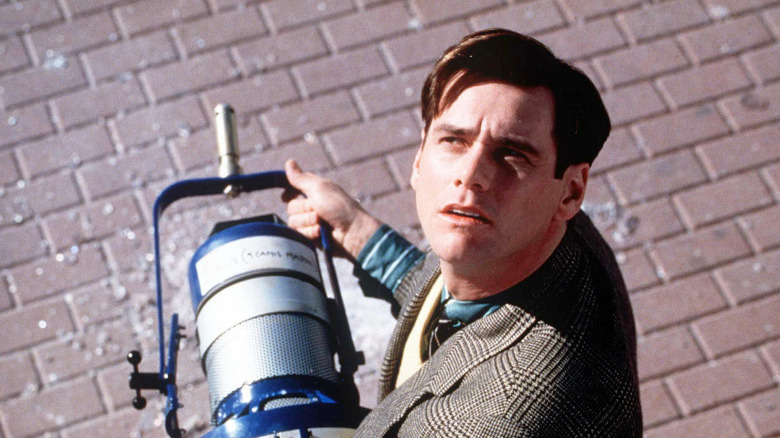
In director Peter Weir's wonderful 1998 dramedy "The Truman Show," Truman Burbank (Jim Carrey) is an affable insurance salesman who quietly yearns for a life less ordinary. He resides in an idealized vision of suburbia with white picket fences and perfectly manicured lawns, unaware it's all a massive set for a TV show about him. Extras roam the streets while hidden cameras monitor his every move 24/7. Even Truman's best friend and wife are really actors who gaslight him when he finally starts to notice the cracks in the walls of his "perfect" life.
Despite the timing of its release, "The Truman Show" didn't originate as a reaction to what was then the cottage industry of reality TV. In an interview with Vanity Fair to mark the film's 20th anniversary in 2018, writer Andrew Niccol explained how his script began with a fear that had plagued him since a very young age: That he was being constantly surveyed and his life as he knew it was one giant lie. His existential dread over what Niccol referred to as "round-the-clock recording and the counterfeit world" would, in turn, inspire a story about a cheekily-named "true man" unaware he's on a TV show.
Knowing this, it's little wonder "The Truman Show" began as a darker sci-fi tale than what ended up on-screen (one that veered even further into the terrain of "The Twilight Zone").
'Andrew Is The King Of Paranoia'

If "The Truman Show" missed the boat when it came to predicting how reality TV would evolve over time, it's because Andrew Niccol was never really trying to satirize shows like "Big Brother" to begin with. "At the time [I was writing 'The Truman Show'], there was no reality television," Niccol told Vanity Fair. "'The Real World' started just after I finished the script."
Lynn Pleshette, Niccol's former literary agent, confirmed as much, having gotten a first-hand taste of his distrusting nature:
"Andrew is the king of paranoia. We once had a meeting at MGM. The valet took our car, and Andrew said, 'Well, he's wearing the valet uniform. But we don't know if he'll bring the car back, do we?'"
Niccol's outlook manifests itself in "The Truman Show." In the film, Truman assumes his fear of the water and anxiety around dogs are the result of childhood traumas (most notably, the "death" of his father in a sailing accident when he was a boy). He never once suspects he's been manipulated into fearing these things as a way of taming his adventurous nature — and why would he? If anything, though, Niccol's early script draft was even franker about the toll these manipulations take on Truman's mental well-being. Per Niccol:
"Truman had a drinking problem. He was cheating on his wife with a [sex worker] — of course, he didn't know that it was the worst-kept secret in the world, since the affair was being televised. In one scene, he fails to intervene in an assault on the subway."
Accepting The Reality With Which We're Presented

Elements like Truman witnessing and failing to prevent a public assault almost made their way into the final product, as evidenced by their presence in the published version of the movie's shooting script. Others, like Truman living in a parallel dimension in New York City, were dropped earlier on. All the same, Sherry Lansing (who was the head of Paramount when the studio acquired Andrew Niccol's script) told Vanity Fair the premise behind "The Truman Show" made it too enticing to pass up, even in its unfinished form:
"I remember thinking that the basic idea was simply extraordinary — that as you think you're going about your life, you realize it's all fake ... And the idea that it could be a television show ... I was involved with the movie 'Network 'as an executive. This script kind of reminded me of the idea that the media in some way could control your life, and that you didn't have free will and that everything in your life was fake. It so resonated with me, that tragic nature of it."
Indeed, at its core, "The Truman Show" wrestles with a simple yet haunting observation made in the film by Christof (Ed Harris), the twisted "showrunner" behind Truman's fake life: "We accept the reality of the world with which we're presented." That the movie argues one both can and should try to challenge and break free of the limitations imposed upon them by society — an idea Niccol also championed in his directing debut on 1997's "Gattaca" — has allowed it to retain its power.
If anything, a film about an ordinary person unknowingly living in a constant state of surveillance (a conceit once easily dismissed as paranoia) hits a little too close to home these days.
Read this next: 20 Underrated Rom Coms You Need To Watch
The post The Truman Show Script Started Out Darker Than You Probably Realize appeared first on /Film.
0 Comments